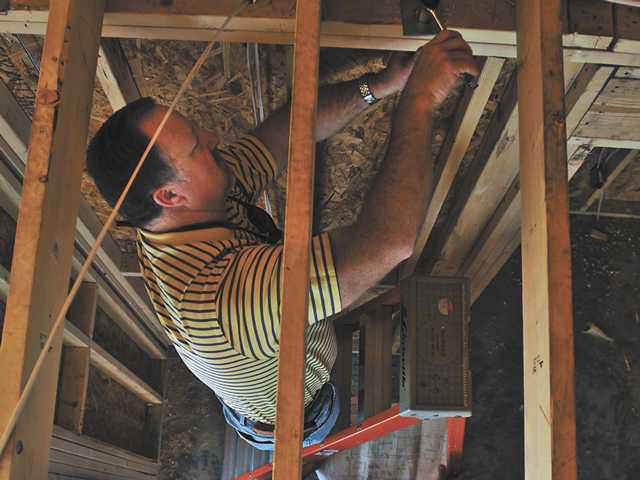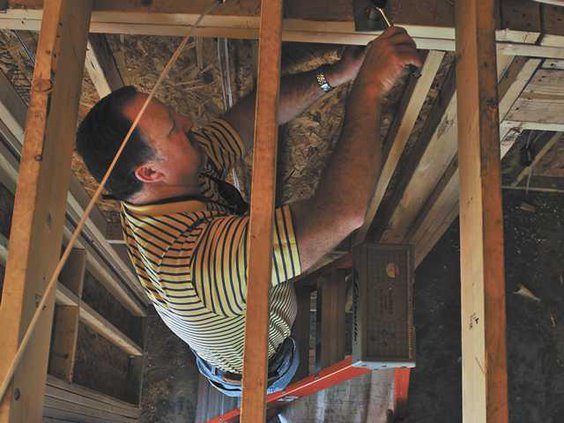Almost two years ago, the rules for residential contractors in the state of Georgia took a dramatic turn.
On July 1, 2008 legislation enacted by the Georgia General Assembly initiated the requirement that certain types of residential and general contractors must be licensed by the Georgia State Licensing Board for Residential and General Contractors.
"The law was enacted because consumers really didn't have anywhere to go regarding the practices of those building or remodeling their homes," said Bob Barnard, owner of Barnard and Associates Remodeling, Inc. in Fayetteville, Georgia, and a member of the new licensing board.
"Basically, the law states that if you did not use a licensed contractor, the consumer and the person doing the construction have no recourse through the Secretary of State's office. Any contract between a consumer and an unlicensed contractor is null and void in the eyes of the state."
When someone decides to build a home, that individual can either hire someone to do it for them, or they can oversee or do the construction themselves. If a consumer chooses to build a residence in the city of Statesboro or in the county and oversee it themselves, they will need to sign an affidavit with the Bulloch County Building and Zoning Department or the city attesting to that fact.
"You have to state that you will be the general contractor, and that you are not paying for someone to do that for you," said Randy Newman, zoning administrator for the Bulloch County Building and Zoning department. "If you are adding 120 square feet of new space, you will need a building permit. Either a consumer or licensed contractor can pull the permit."
Newman acknowledged that this has been a big change, but one he feels has been for the better.
"I have heard several people say that they would never build their own house again," Newman said. "It is hard to tell someone that they have to tear down a wall, because it doesn't meet the code. With a licensed contractor you have recourse for that. There are checks and balances."
Where the state may require that a licensed general contractor pull the permit for construction, private mortgage lenders aren't as particular about who is responsible for the construction of the residence. While it is true that government lenders such as FHA, USDA, and VA require that an approved licensed contractor build or remodel the home, many private mortgage lenders are looking for a certified appraiser to determine value.
"The private mortgage lenders that we use don't require that a licensed general contractor build the home," said Sherri Hinson, a member of the mortgage department of the Farmers and Merchants Bank. "The mortgage lender is working off of the final appraisal of the home. However, public lenders do specify that the home must be built by an approved general contractor that is on their list."
Jamey Cartee, a local licensed general contractor and owner of St. Andrews Builders in Statesboro feels that poses an interesting problem for local banks.
"Let's say that you want to build your own house, so you must get a construction loan while it is being built," Cartee said. "At the end of construction, it is assumed that a mortgage will be obtained and the construction loan settled. However, what if there is an accident on the job site, and the person involved in the accident sues. There is no general contractor present, so therefore, there is no liability or workman's compensation insurance. Everything grinds to a halt. What is the bank's position then?"
Newman also pointed out that Bulloch County is now subject to more stringent wind load standards for hurricane force winds. "If you are going to do things yourself, you better understand the new rules."
Barnard said one of the abuses that has begun since the law was enacted is one of licensed general contractors pulling permits for unlicensed general contractors.
"They pull the building permit for their buddy or for money, so that he can do the job," Barnard said. "That is illegal. Just recently a Georgia general contractor had his license revoked for five years for doing that very thing. Building officials can also get in trouble for knowingly allowing that to occur without reporting it."
Barnard said even though the new law is having a very positive effect, the industry is going to have to police itself.
"The new law came into effect when things were really busy, and we weren't necessarily paying attention to what others in our industry were doing," Cartee said. "Now we are bidding all different types of jobs, and I can see that in addition to misunderstanding, people are choosing to ignore the new law and what their responsibilities are."
Cartee said some people in the building industry are putting themselves in the position of being a contractor that is not licensed.
"If you are calling on people to come to the job site and do work that don't work for you, then you are contracting," Cartee said. "And for many, that is out of the boundary for what that person is licensed to do. This law was enacted to protect the consumer."
Barnard said he feels that some of the ignorance of the new law comes from a lack of advertising of it.
"The state doesn't have the money to get the word out about licensed contractors," he said. "Even so, I feel like as an industry, we are 65 to 70 percent of where we need to be, and that is very encouraging. Some of that progress is because things have slowed so much, but also, the word is getting out, and the law is being enforced.""
Barnard said something that most people don't realize is how the law affects the rental market. "If you buy a home for rental purposes, i.e. it is going to be used by the public, then any work that is done to it must be done by a licensed contractor.
"If you are involved in the construction industry, involved in a construction project, or are a consumer, you can familiarize yourself with the regulations by going to www.sos.ga.gov/plb/contractors," he said.
To verify that the person is properly licensed, you can visit the following state of Georgia website https://secure.sos.state.ga.us/myverification/. You may search by name or by license number. There are also "tips for consumers".
"I will say that our number of reinspections has gone down drastically since the enactment of the law," Newman said.
Licensing helping builders
Changes result in fewer reinspections, disputes


Sign up for the Herald's free e-newsletter